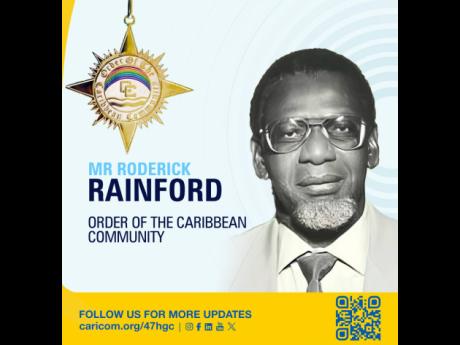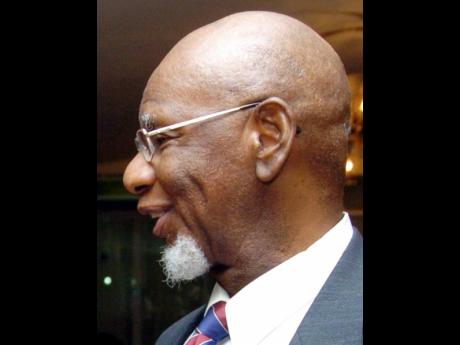Editorial | CARICOM fixes oversight
The Caribbean Community (CARICOM) has fixed a glaring omission in its society of distinguished regional citizens by elevating Roderick Rainford to the Order of the Caribbean Community (OCC).
As this newspaper pointed out in May while celebrating the appointment of Clive Lloyd, the former great West Indies cricket captain, to the order, Mr Rainford was the only past CARICOM secretary general (not counting Barbadian Fred Cozier who had a brief stint as head of CARICOM’s predecessor, the Caribbean Free Trade Area (CARIFTA)) not, up to then, to have been invited to membership of the OCC.
We suspected then that CARICOM’s oversight had to do with Mr Rainford’s quiet equanimity, which, over his long and distinguished career as a Jamaican and regional public servant, caused many people to initially miss, or underrate, the depth of his intellect and his unassuming effectiveness.
Not only is Roderick Rainford profoundly decent, he fails to call attention to himself, or his achievements.
Ironically, it was during Mr Rainford’s tenure as secretary general (1983-1992) that the Order of the Caribbean Community was conceptualised and implemented.
That was not, by any measure, the real substance of Mr Rainford’s accomplishments as secretary general.
For example, as The Gleaner recalled in May, it was early in his tenure that Maurice Bishop’s revolutionary government in Grenada imploded, leading ultimately to the US invasion of the eastern Caribbean island.
Mr Rainford’s even-temperedness helped to maintain calm, rather than disintegration, in a fractious community.
It was during his tenure, too, that the community launched the Grand Anse Declaration in Grenada, establishing the intellectual framework for transforming itself into a genuine single market and economy. The CARICOM Single Market and Economy (CSME) remains, unfortunately, a too-slow work in progress.
In a sense, it is fitting that it was in Grenada that Mr Rainford’s wife received the OCC on his behalf.
And that an oversight, without being formally acknowledged, was fixed.
SPECIAL RANK
Now that this matter has been attended to, The Gleaner believes that there are a handful Caribbean leaders who deserve, posthumously, to be brought within the ranks of the OCC.
Further, we suggest that CARICOM consider the possibility of a new, very limited rank within the order for a few regional citizens who ought to have a special place, even among an outstanding pantheon of personalities.
With respect to candidates for regular membership, this newspaper recommends for the next round of selection the former Barbadian prime minister, Owen Arthur, who died in 2020.
Hard-working and sharp of intellect, Mr Arthur was a regionalist to his core. He made legendary efforts during his premiership (1994-2008) to give life to the CSME, and was among the driving forces behind the establishment of the Caribbean Court of Justice.
We are surprised, too, that another former Barbadian leader, Errol Barrow – a profound regionalist of the generation who shaped and sharpened their regionalism in post-War London – is not among the members of the OCC. Mr Barrow was one of the founders of CARIFTA, the precursor to CARICOM.
Unless Mr Barrow left instructions against being conferred with honours, his absence from the order must be remedied.
With respect to membership of the limited, special rank of the OCC, there is a group of early anti-colonial, regionalist leaders worthy of consideration. They include Barbados’ Grantley Adams; Robert Bradshaw of St Kitts and Nevis; William Bramble of Montserrat; Vere Bird Sr of Antigua and Barbuda; and Jamaica’s Norman Manley.
For the avoidance of doubt in making these suggestions, The Gleaner does not propose any softening of the criteria for membership of the OCC.
We expected it to continue to be an honour to be aspired to, and gifted only on the highest order of achievement, as is the case with the current members.


